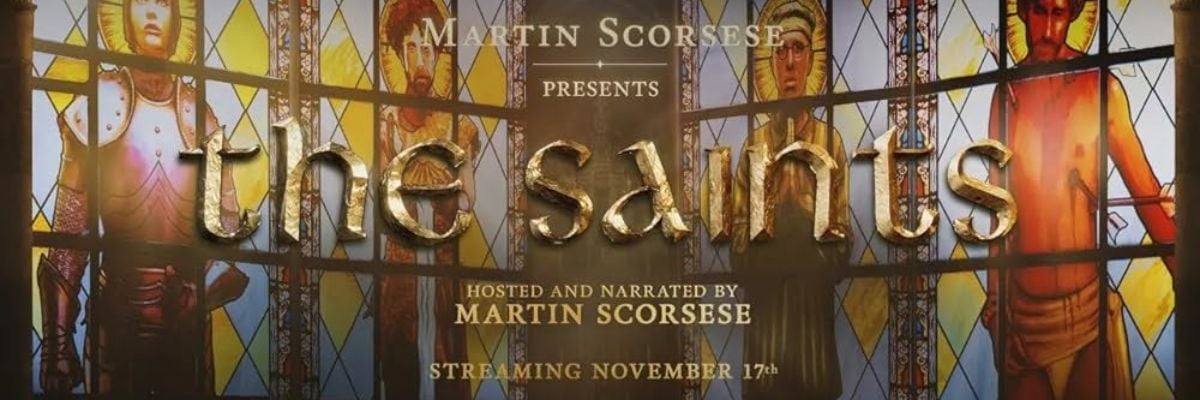
There is a new docuseries, streaming exclusively on FOX Nation, helmed by the renowned and rough-edged director Martin Scorsese. Martin Scorsese Presents: The Saints features cinematic enactments, with documentary-style insertions, of the lives of St. Joan of Arc, St. Maximilian Kolbe, St. John the Baptist, St. Sebastian, St. Francis of Assisi, St. Thomas Becket, St. Mary Magdalene, and St. Moses the Black.
From looking at two episodes, indications are that this series will be burdened with Scorsese’s certainly complicated and perhaps relativist relationship with Catholicism.
Executively produced and narrated by Scorsese, the series clearly has real cinematic quality: excellent costumery, convincing sets, strong direction, and other signs of high production value. It flounders where many films do these days: the writing. The scripts are weak, and their weakness inevitably brings down the acting.
It’s a shame to see good cinematography and great subject matter beaten down by clumsy efforts to capture complexity and spiritual transcendence in restrictive forty-five-minute slots. But it is interesting to see creative effort poured into the heroism of the saints.
There is a faithfulness that rings through the frames that is refreshing to see in a screen version of sacred stories. Given his long history with contemplating and considering the Catholic faith, Scorsese seems to have had a genuine drive in bringing these stories to the public with attention, technique, and respect.
Scorsese has been on a hunt for truth all his life, especially religious truth. Once considering a priestly vocation himself at a minor seminary in New York, he eventually embraced a career in film and became one of the greatest directors of all time. But so many of his films reveal his search for the elusive God of his youth.
Perhaps his masterpiece, The Departed, swirls around the baffling and brutal interplay of good and evil in a morally muddied world. His film Silence, about Jesuit missionaries in seventeenth-century Japan, is a wrenching meditation on the difficult search for religious truth that ends again and again in uncertainty.
In discussing religion, Scorsese has said, “Many people are trying to find religion outside of religion.” The Saints falls prey to this same criticism. There is a contradiction at work in the series, summed up in the incongruity between reverence and graphic imagery, struggling to be respectful while leaning into voyeurism.
This discordance arises from Scorsese’s apparent temptation to relativism. Two episodes, on Joan of Arc (released November 17) and Maximilian Kolbe (to be released December 8), seem bent on depicting these two saints as outsiders, as Catholics who swam against the stream of what it meant to be Catholic in their times. Joan insisted on her visions and wearing men’s clothes and was killed by churchmen. Kolbe had antisemitic sentiments, as most Catholics did, but broke free in his sympathies for Jewish victims of the Holocaust. These divergences are stressed.
The series allows that saints are human, committed sins, and were often controversial. But for the sake of these episodes, the “controversy” is that the saints are trailblazers, going against the grain. They are saints in their bravery to go beyond tradition and teaching, interacting as they did with troubled people and challenging situations. Their valor, virtue, and piety are on full display, but so is a certain rebel streak.
In this, the filmmakers propose to regard Catholicism and sainthood in relative terms as opposed to dogmatic terms. They make room for the Church, the mysteries of faith, and the sacramental devotions that inspired saints like Joan of Arc and Maximilian Kolbe (and John the Baptist, whose episode aired a few days ago), but they also invite their viewers to think outside the ancient, established boundaries of the Catholic Church and imagine that sanctity and salvation can come from elsewhere.
After the film portion ends, there is a short conversation about the saint led by Martin Scorsese involving a priest, a poet, and a historian. That priest is Fr. James Martin, whose infamous lobbying regarding Catholic homosexual acceptance has made him an unsavory figure. Although it is encouraging to hear Fr. Martin in these conversation portions speaking well and warmly of the saints and the spiritual life, it is nevertheless impossible to dismiss the push, however gentle, toward an unorthodox openness regarding the Catholic life that, purportedly, these saints modeled.
Scorsese has a passion to pin down religious truth—or to find religion outside religion, whether by faith or by force. This is the weightiest subject that he tries to express with his art. As an artist, Scorsese strikes out for God with a robustness that can be reckless and can provoke the demand for divine approval of our sins.
Those unfamiliar with the violent struggle of faith and resignation to the human condition in many of Scorsese’s films should be wary of his religious films, which lean relativist and can, unfortunately, be outright blasphemous. Part of that blasphemy is the suggestion in Scorsese’s religious imagery that Christianity is incompatible with happiness. Scorsese considers himself a Catholic, but his vision of the Faith is impaired, obstructed by the visceral and virulent qualities of the society that has swallowed him and his industry, leaving him with an artistic questioning—and the saints are rich material for such questions.
That probing comes through in both the tone and tenor of The Saints. Though the filmmakers are respectful of and deferent to the grandeur of these characters and the glory of their faith, there is still the hint of something that wants to elbow the Catholic faith beyond its boundaries—to show that it’s all right to break the rules—and to use the stories of the saints to propose and encourage that motion. It is as though they are trying to find religion outside of religion.
Now, of course, the saints did break rules—but they were rebels according to the paradoxes of the beatitudes, and not progressives or freethinkers who couldn’t be contained by the dusty laws of the Church.
They were risk-takers, to be sure, and Scorsese admires the saints for the risks they took to live out their faith with kindness and courage. But to probe the borders of Catholicism with the intention of, perhaps, hitting upon some neglected or even forbidden path that really leads to fulfillment and salvation is not a risk worth taking. There is risk enough in holding to the tenets the Faith has enshrined in the face of a present that is far more interested in the future than in the past.
Martin Scorsese Presents: The Saints is a slick treatment of holy history. In some ways, as far as modern media go, it is unusual. But it is still infected by the unholy urge to break free from religion as an organized movement. Giving credit where credit is due, it is good to see such artistry in depicting the lives of the saints, but that doesn’t eliminate the problem of what lies beneath the surface. Catholics would not necessarily make a mistake in watching this series, but they should keep their guard up. It is an exercise in discerning wheat from chaff.



